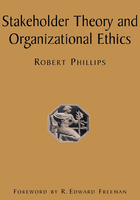
FOREWORD
Think about the recent headlines. Several who’s who of American businesses have been dragged through scandal after scandal. Is there no ethics in business? Haven’t business schools been teaching business ethics? Haven’t the last 25 years of teaching and research in business ethics by philosophers and management thinkers made a difference? What’s missing are a range of useful ideas and theories that managers can use to make better decisions. Robert Phillips has helped to remedy this situation with a very practical book.
He cuts through many vexing questions to propose a theory of organizational ethics that takes two important ideas seriously. The first is that organizations are dependent on their stakeholders for their successes and their failures. In fact he suggests that it makes little sense to talk about organizations in general and businesses in particular without paying careful attention to the essence of these stakeholder relationships. The second idea is the multifaceted theory of ethics from philosopher John Rawls and his followers. The heart of Rawls’s view is his theory of justice articulated in the principle of equal liberty and the difference principle. The first admonishes us to take freedom seriously, a fact without which capitalism as we know it, is impossible. The second tells us that equality can’t be left too far behind, a fact that we seem to have forgotten in recent times.
Phillips weaves a narrative of these two threads that tells an important story for business. Unlike the endless theorizing and counterexamples of philosophers, on the one hand, and unlike the mindless study of managerial opinion by “social scientists” on the other, Phillips suggests a point of view about business ethics that is at once normative and empirical. He grounds this point of view in the stakeholder literature and in Rawlsian ethics, and offers business ethicists a chance to escape their nineteenth-century intellectual prison fashioned by utilitarianism, Kant, and rights theory.
The heart of Phillips’s argument is the notion that business needs to be based on an idea of fairness. Without fairness at the core, stakeholders will use the political process to hamstring economic activity—and rightly so in a just society. If executives come to base their decisions on Phillips’s idea of fairness, or another well justified one, there can be little argument about justifying the regulation of economic activity.
Building new theory is sorely needed in this area, and theory of the pragmatic variety like this one, is on target. But, Phillips doesn’t stop there. He shows how his ideas about fairness and stakeholders have practical consequences for the way that organizations treat certain stakeholder groups. According to Phillips, some are legitimate and others are merely instrumental (i.e., they can affect legitimate stakeholders, and so must be managed strategically). This question of legitimacy has many organizational implications for the identification and prioritization of key stakeholder groups.
Phillips joins a long line of distinguished management thinkers who have made “stakeholders” the centerpiece of their managerial mindset. He takes a well-deserved seat beside (1) the pioneers of the idea in its early days at the Stanford Research Institute (now SRI International), Igor Ansoff, Bob Stewart, Marion Doscher; (2) theorists such as Russell Ackoff, James Emshoff, Richard Mason, Ian Mitroff, Eric Rhenman, Fred Emery, and Eric Trist; and (3) contemporary thinkers vii such as Tom Donaldson, Lee Preston, Tom Dunfee, Jim Post, Tom Jones, Jeffrey Harrison, Donna Wood, Ron Mitchell, Brad Agle, Andrew Wicks, and others.
No theory is perfect, but as diverse people such as Immanuel Kant and Leonard Savage tell us, there is nothing so useful as a good theory. And, Phillips has produced a good one—both practical and well argued. One can’t help but wonder whether we would have been treated to the current wave of scandals, as well as the hue and cry for more ethics in business, if Phillips’s ideas were more widespread.
In short, read this book. Follow the argument. Think twice about what Phillips is saying to you and your organization. Figure out who are your legitimate stakeholders. Think about what it means to be fair to them, and for them to be fair to you. Engaging in this dialogue will make your business better. You will create more value and you’ll do the right thing.
R. Edward Freeman
Charlottesville, Virginia
4 March 2003